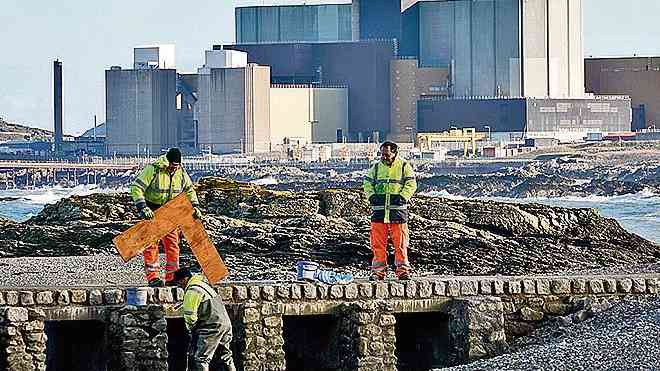Britain’s nuclear sector has endured a further setback after stalled plans for a power plant on Anglesey were abandoned by the project’s Japanese owner.
Hitachi blamed “increasingly severe” investment conditions in the midst of Covid-19 as it exited a venture to build the Wylfa Newydd nuclear site.
The decision will blight aspirations to replace ageing plants across the UK. The Horizon project was expected to provide about 6 per cent of the country’s electricity, powering some 10 million homes.
Local councillors lamented the “devastating blow” to Anglesey’s economy. Horizon had been in development since 2012 but Hitachi suspended work last January after failing to find funding for estimated costs of up to £20 billion.
Although it laid off more than 300 employees, it retained a skeleton staff and was continuing to seek planning consent.
The venture — with a lead site in north Wales and another in Oldbury, south Gloucestershire — aimed to start up Wylfa in the mid-2020s. It was expected to create thousands of jobs.
The two plants were among six proposed facilities that ministers had hoped would replace ageing reactors due to shut over the coming years. Only one is actually under construction: Hinkley Point C, in Somerset, by EDF of France and CGN of China. The remaining projects have struggled to find a viable financing model. Toshiba, also of Japan, scrapped its project to build a reactor at Moorside in Cumbria in 2018.
Hitachi said that it had made its decision given that 20 months had passed since the suspension, and that the investment environment had become increasingly severe as a result of the pandemic.
Justin Bowden, national secretary of the GMB union, said that the news was “utterly predictable” and the “outcome of successive government failures to act decisively around new nuclear”.
The government acknowledged that it was “very disappointing” but insisted that officials had offered assistance “well beyond” what previous administrations considered providing.
Duncan Hawthorne, chief executive of Horizon, said that nuclear power had a critical role to play in tackling energy needs, meeting climate change targets “and levelling up the economy through green growth and job creation”.
“I understand this announcement will be disappointing for our many supporters who had hoped to see our project through to completion and I would personally like to thank you for your support throughout our time on this project,” he said.
Anglesey and Oldbury remain “highly desirable” sites for a nuclear project, he added, and Horizon “will do our utmost to facilitate the prospects for development”.
A spokesman said that the government was open to talks over “new nuclear projects with any viable companies and investors wishing to develop sites in the UK, including in North Wales”.
Hitachi had been offered “all of the required debt financing to complete construction” as well as “generous financial support” through a contract for difference scheme, they claimed, in exchange for a one-third equity stake in Horizon.
“Nuclear power will play a key role in the UK’s future energy mix as we transition to a low-carbon economy, including through our investments in small and advanced modular reactors,” the spokesman added. “That’s why we previously offered a significant package of potential support to this project that went well beyond what any government has been willing to consider in the past.”
Hitachi, which has already booked a writedown of ¥300 billion on its British nuclear business, said that the decision was unlikely to have a significant impact on its results.
